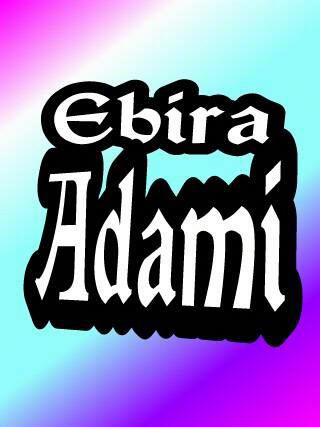
That a people without a culture is like a people without history, our traditional festivities if handled with humility and the necessary modernity could become a world class tourism that can take us to the world map of hospitality, hence improved Ebira economy, employment and influence word over.
This we can not achieve except we shun violence within ourselves so that our name EBIRA shall come to bare fruit in heart of mankind. As we invite them to join in the celebration of our unmatchable heritage Ebira Kaneri. Eche-Ori We are farmers and farming is the pride of the Anebira economy,
'Eche Ori' is our new yam festival celebrated only in two districts of Ebiraland. These are Ihima and Eganyi. During the festival, traditional worshippers make sacrifices in the secret groove of 'Ori' (deity) high up in the mountain to show gratitude for its protection and provision of bounteous harvest. The worshipers carry long canes with which they whip one another in turns without anyone exhibiting any sign of pain. This is a mark of strength or manhood. Another important attraction of the festival is the delightful 'Echori' music in which female singers feature prominently.
Only after this festival can one eat or sell new yams in our markets as it is a taboo to do so before the festival in Ihima and Eganyi.
Ekuechi (Traditional Night Masquerade): This is a night masquerade festival which marks the end of the Ebira calendar year and the beginning of a new one. Ododo is popularly acclaimed to be the initiator of this masquerade festival.
The 'Akatapa' masquerade heralds the beginning of the festival often saying "Irayi ododo osi gu, Irayi akatapa osi gu eeeh! Osa yeeeh!".
Which means "the year of the Ododo has ended; the year of Akatapa has ended. Here is another year".
The festival begins with a festival eve in which folk singers (omikede) perform to the delight of both men and women. The following day, the real festival in which masquerades sing and dance to entertain people from dusk to dawn takes place. It is restricted to men and few special women called onoku only so all and majority of our women stay indoors throughout the duration of the festival. All dead relatives are believed to return to earth on a visit this night, so, women prepare delicious 'Apapa' (bean read) and he-goat meat for the visitors.
The women also, at times, leave monetary gifts with the men for the visiting dead relatives. Trust men, the meals and gifts are properly and neatly delivered to the beneficiaries who only the men have the privilege of seeing and interacting with, that night.
Traditional Marriage in Ebira Land Ebira people, mostly living along the River Benue plain down and beyond the River Niger, are a tribe found in Kogi state in Okene, Okehi, Adavi and Ajaokuta local government areas and in some parts of Nassarawa, Plateau and Edo states. The word Ebira means good behaviour when translated literally with ethics and hospitality as compliments.
The unique features of the Ebira culture with its ethnic aestheticism, are appreciated most in the event of traditional marriages.
Victoria Mayaki sheds more light on this. When a man sees a lady he intends to marry, he discusses his intentions with her, who, if interested, tells him to bring his people to express his intentions to her parents.
In respect to the Ebira tradition, the man does not walk to the parents of the woman to disclose his intentions; his parents or elders mostly the women do this by going to the lady’s parents to introduce themselves and also to inform them of their reason for coming to the house.
After this is done, the parents of the lady then conduct a thorough investigation on the upbringing, background, family history and so on, of the intending groom to unravel any history of madness, terminal diseases or criminality in the man’s family.
This is with a view to deciding whether or not to give their daughter’s hand in marriage to a family with a tainted reputation in the society. After the research, if their findings are appreciable, an approval is given to the man to visit the bride-to- be from time to time to further get to know themselves properly.
A date is later picked for the formal introduction of both families and this is called “Ise Ewere” which literally means what has been in secret is now in the open. During the celebration, there is usually the presentation of gift items made by the family of the groom to the family of the bride. The gift items usually include; about 42 tubers of yam, dried fish or bush meat, 10 liters of palm oil, a bag of salt, assorted wines and kola nut. The groom may also decide to present two wrappers to his would-be bride but this is optional.
On the day of introduction, it is not necessary that the man attends the occasion as his family members do the necessary things on his behalf. The bride’s family in turn, entertains the groom’s with food and drinks. The families interact with one another and formally introduce every member of both families. After this is done, the date for traditional marriage is then fixed. The tubers of yam and other items brought are distributed to neighbours and members of the extended family no matter how small.
Much significance is given to this to ask for their prayers for a happy marriage as well as to ensure the acknowledgementof the community that the lady now has someone she intends to get married to. The amount to be collected.
To be continued......




